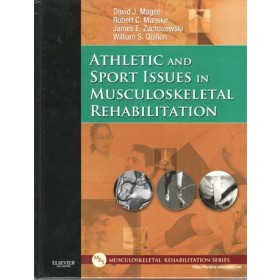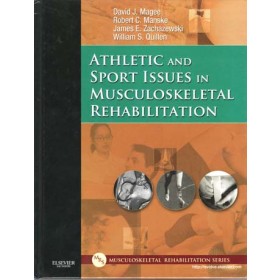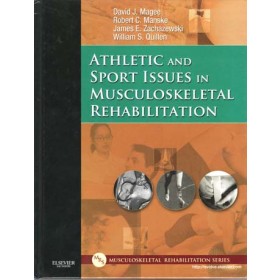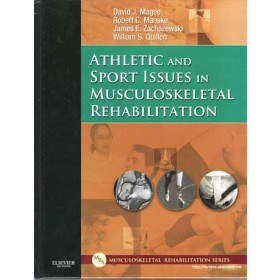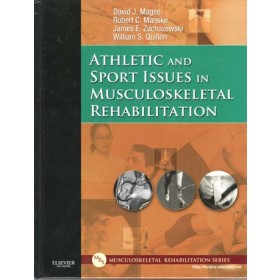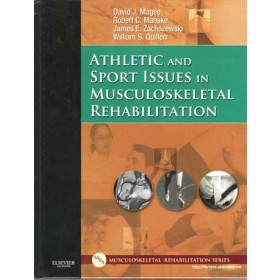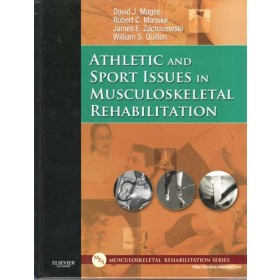Details
Athletic and Sport Issues in Musculoskeletal Rehabilitation: Module 1
SKU: 751
by David J. Magee, PT, PhD, Robert C. Manske, PT, DPT, SCS, Med, ATC, CSCS, James E. Zachazewski, PT, DPT, SCS, ATC, and William S. Quillen, PT, PhD, SCS, FACSM
These courses are offered in cooperation with Elsevier Health and utilize the hardback textbook, “Athletic and Sport Issues in Musculoskeletal Rehabilitation” by David J. Magee, PT, PhD, Robert C. Manske, PT, DPT, SCS, Med, ATC, CSCS, James E. Zachazewski, PT, DPT, SCS, ATC, and William S. Quillen, PT, PhD, SCS, FACSM.
These courses provide expert insight and clear rehabilitation guidelines to help you manage injuries and special medical needs unique to your athletic clients. Contributions from leading physical therapists, athletic trainers, physicians and orthopedic surgeons give you a comprehensive, clinically relevant understanding of common sports-related injuries and help you ensure the most effective therapeutic outcomes. These courses are essential to everyone on the sports medicine team!
Module 1: covers preparation and prevention in sports medicine including the role of the sports medicine team, pre-participation physical fitness profiling, psychosocial aspects of youth sports and nutrition counseling and athletes.
Module 2: covers preparation and prevention in sports medicine including environmental considerations for sports, use of ergogenic aids in sports and sports drug testing issues
Module 3: covers applied biomechanics of cycling, golf, jumping and tennis
Module 4: covers applied biomechanics of soccer, running, swimming and baseball pitching
Module 5: covers management of sports injury and illness including delayed-onset muscle soreness, medical conditions in sport, dermatologic considerations in athletics and protective equipment in sports
Module 6: covers management of sports injury and illness including sports related concussions, traumatic injuries to the cervical spine, maxillofacial injuries and abdominal and thoracic injuries.
Module 7: covers special populations and epidemiology including the female athlete, musculoskeletal dance medicine and science, the athlete with disabilities, and selected rehabilitation needs of the masters athlete.
Module 8: covers applied biomechanics of common weight training exercises, taping for athletics and rehabilitation and applied sports injury epidemiology
Course Length: 8.0 contact hours
Instructional level: Intermediate
This package contains the reading and testing materials for Module 1 only.
Athletic and Sport Issues in Musculoskeletal Rehabilitation: Module 1
Course Goals and Objectives:
Course Goals: This course is intended to instruct the student through self-paced study on the foundation of providing intervention for the athlete and the role of the sports medicine team, pre-participation evaluation and physical fitness profiling, and psychosocial/nutritional aspect of youth sports and athletes
Student Objectives:
At the end of this course, the student will be able to:
1. Understand the role of various medical professionals on the sports medicine team.
2. Analyze the need for competency in the sports medicine team.
3. Evaluate the time line for an appropriate pre-participation evaluation.
4. Evaluate four types of athletes their safe participation in sports.
5. Understand visual acuity as it relates to the PPE.
6. Evaluate participation by an individual with epilepsy in four specific sports.
7. Understand the relationship of athletics and four cardiovascular abnormalities.
8. Analyze appropriate hemoglobin levels in athletes.
9. Analyze factors that could prevent an athlete from participating in contact sports.
10. Understand the role of the sports medicine team as it relates to the physical fitness profile.
11. Evaluate an athlete with asthma and possible participation in athletic events.
12. Evaluate four common functional tests for muscle power.
13. Evaluate four common functional tests for baseball players.
14. Understand two tests for anaerobic conditioning.
15. Evaluate the possibility of moving from high school athletics to collegiate athletics.
16. Understand the emotional consequences of injury and burnout.
17. Evaluate the American Academy of Pediatrics’ recommendations for young athletes.
18. Understand second impact syndrome as it relates to young athletes.
19. Evaluate the recovery time from a simple concussion.
20. Evaluate four common recreational drugs and their use by young athletes.
21. Understand the relationship of orthopedic dysfunction and eating disorders.
22. Evaluate the female athlete triad.
23. Evaluate steroid use in young athletes.
24. Analyze a diet assessment in athletes.
25. Understand the body’s use of diet as it relates to energy and recovery.
26. Evaluate the proper carbohydrate intake for training needs.
27. Understand branched chain amino acids.
28. Understand additions to the diet necessary for increased muscle mass.
29. Evaluate four nutrients and their relationship to the immune system.
30. Understand the body’s source of fuel during low intensity exercise.
31. Analyze four types of fat.
32. Analyze water soluble and fat soluble vitamins.
33. Understand the relationship between endurance athletes and hemoglobin concentrations.
34. Understand the difference between trace minerals and major minerals in the body.
